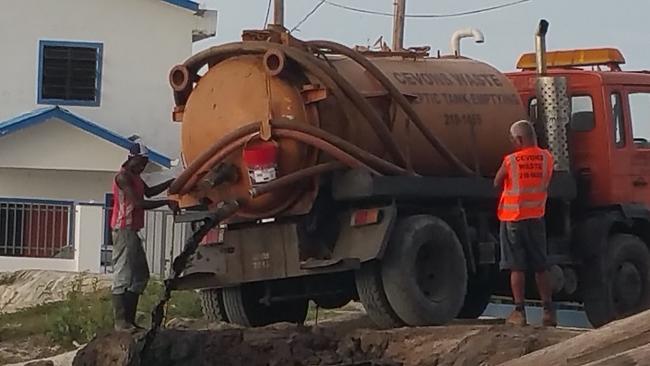Recently a staff member witnessed the dumping of what might be human waste at the mouth of the Demerara River near to the newly built Marriott Hotel in Georgetown, Guyana.
From the photograph and video it is obvious that this location has been in use for a long time because of the stains on the surrounding rocks and seawall.
The Guyana Environmental Protection Agency and the Ministry of Health must make it their duty to visit the location then take the necessary steps to ensure that the practice of waste dumping is immediately ceased. Appropriate facilities must be provided for the disposal of all hazardous waste and enforcement must follow. Citizens must be informed of the remedial actions taken to halt the illegal action.
While it might seem that a truck load of human waste being deposited into a vast body of water is not a problem, the United Nations has identified incorrect disposal of human waste as a major issue. According to UN studies “In the developing world, roughly 90 per cent of sewage is discharged untreated into rivers, lakes and coastal areas, with a widespread negative impact on health. Each year, an estimated 2.5 billion cases of diarrhea occur among children under age 5. Water and sanitation interventions can reduce diarrhea child deaths by 88 per cent.”
“This type of pollution impacts the usability of ground and surface water, and leads to severe disruption of environmental processes and the destruction of ecosystems. Aquatic dead zones, locations with reduced or no oxygen in the water, have grown to cover 245,000 kilometres of marine environment, including in Asia, the Caribbean, Europe and North America. In South-East Asia alone, 13 million metric tons of faeces are released into inland water sources every year – along with 122 million cubic metres of urine and 11 billion cubic metres of grey water.6 This presents a major health threat to people who depend on open streams and wells for their drinking water, as well as an economic challenge to people whose livelihoods depend on fisheries.”
To learn more about this issue visit http://www.un.org/en/events/toiletday/pdf/Planners-Guide-Fact-Sheet-5_English.pdf.







